
ARCHIVES
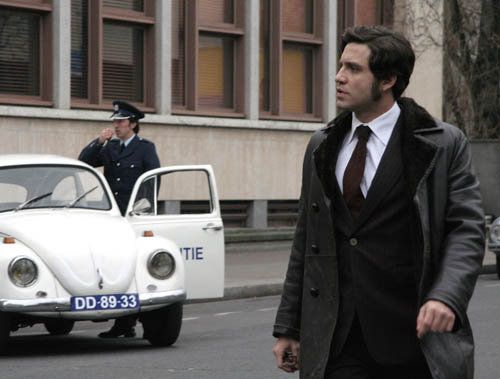
EDGAR RAMIREZ DELIVERS ONE OF THE YEAR’S
BEST PERFORMANCES IN ‘CARLOS’
Hunky Venezuelan actor Edgar Ramirez first turned American heads in 2006 with his performance in his English-language debut Domino. Since then roles in U.S. productions such as The Bourne Ultimatum, Vantage Point and Che have followed, but it’s his stellar performance in the powerful five-and-a-half hour film Carlos that is sure to earn him an numerous awards and accolades. Unfortunately, Oscar regulations about films airing first on TV, as Carlos did as a 3-part miniseries on the Sundance Channel, might just rob him of an Academy Award Best Actor nomination.
Regardless, Ramirez delivers the goods in Carlos, a film that tells the story of lich Ramirez Sanchez, AKA Carlos the Jackal, a legend in the espionage world for over 30 years. The anti-James Bond, he was a mercenary and terrorist, depending on your point of view, and worked for radical Palestinians from the FPLP, Syria, Libya, Iraq, and Ceaucescu's Romania.
In Carlos, directed by award-winning French filmmaker Olivier Assayas, Ramirez speaks several languages in the film that shot in numerous locations including France, Germany, Hungary, Austria, Lebanon, and Yemen.
The film traces two decades in the life of the notorious terrorist, who is currently serving a life sentence in La Santé Prison in Paris for the murder of two French agents of the DST (counter-intelligence) and an alleged informant.
A native of Caracas, Venezuela, Ramirez grew up all over the world due to his father’s job as a military attaché. He has made his home in such diverse countries as Austria, Canada, Colombia, Italy and Mexico and is fluent in German, English, French, Italian and Spanish. Throughout his travels Ramirez developed a great love and ability for intercultural communication, a skill he parlayed into a degree in journalism, specializing in political communications and initially intended on becoming a diplomat.
Extremely astute, articulate and affable, Edgar Ramirez is not your stereotypical movie star. A disciplined man who enjoys delving headfirst into research to prepare for a role, he is committed, so much so that he bares his all in Carlos in addition to gaining 35 lbs for the role, morphing himself from an Adonis to a plumb mess.
Unaware of his next onscreen role, the actor admits contemplating future acting gigs and reading other scripts while in production would be a disservice to his craft. Werecently caught up with the breakout star and talked all things Carlos, his sense of discipline and his refusal to go Hollywood.
Congratulations on Carlos. How daunting was it playing such a demanding role in a nearly six-hour film?
Edgar Ramirez: In terms of energy consumption it was very clear, this was a five and a half hour movie and a seven-month shoot in so many locations. I had to really focus on distributing my energy throughout the whole movie because I knew it was going to be long. And this is a story packed with very intense scenes so it’s not only the length but also the intensity of the movie. It’s a tour de force, however, I tried not to over intellectualize what I was about to do. I did all my research and my preparation prior to the shoot and then I just forgot about it and played like it was a soccer game.
Airing in three parts on the Sundance Channel and then condensed for a theatrical release, are you confident they can get the story right in the shortened version?
Well, I saw the shortened version already and I liked it. It’s different but it stands on its own. Olivier didn’t try to tell the exact same story in the short film. You can’t really tell the story in three hours that you told in five and a half hours. You have to pick another point-of-view to tell the story. And I think Olivier did a great job picking a different point-of-view to tell the same story. It’s very interesting to watch both.
Do you believe that the proper way to see Carlos is on the big screen? Are you disappointed it will be airing first on TV?
Cinema is a spirit. It’s not a format. It’s about the complexity of the storytelling and the amount of honesty and sensitivity that you give to it.
In Carlos you literally bare yourself, was that because you were so committed to this film or you would do that regardless for any role?
I’m committed to all my roles so there’s no other way for me to play a part. So if I’m committed and nudity is required I go for it because I already understand my character. It’s not that I would chose to get naked or do certain things for a specific character, for me I go through the selective process before getting a role. Once I select my role I’m very committed to them and I’ll do whatever it takes to tell that story. It’s not that I’ll be naked in one movie and not in another, if it requires it I will, but it always depends on the character.
Your body transforms throughout Carlos from lean and fit to overweight. What was that like for you to go through?
The whole body change was also a metaphor to show, not only the physical degradation, but to show the emotional and ideological degradation of the character. So you go from this fit guy at the beginning and then you start to see how he begins to wear down until he becomes a total mess due to the consequences of his choices. I think it was a fundamental part of telling the story to see his physical degradation.
How much weight did you gain?
Thirty-five pounds.
Did you shoot the film in sequence?
It was chronological. I was thin in the beginning and then a little bit fatter and then the fattest at the end.
Was it fun because you could eat whatever your wanted or was it difficult?
Not really, when you’re forced to do things it’s not fun anymore. The same psychological pattern that you apply to lose weight is the same you use to gain weight. You’re forced to eat five times a day and have to eat pasta five times day to gain all that weight, it’s not fun anymore because you don’t enjoy the pasta anymore and you just want a light tuna salad but you can’t.
What was it like when you wrapped production and then you had to lose weight?
I was very tired because it was a lot of work but I was very satisfied. I prepared before to lose the weight. It was not easy but I had prepared my body, however, certain pounds were difficult to lose to go back to where I was but I was satisfied. During the process it was a little disorienting. I would look at myself in the mirror in the morning and it was weird. Even being fat, I was changing looks for the character. Sometimes it was strange when I would catch my reflection. ‘Who’s this guy walking next to me?’
Growing up in Venezuela, how much did you know about Carlos the Jackal?
My knowledge was very general; it was part of the myth.
Did you learn about him in school?
No, not at all, just in the media you would hear stories of this crazy Venezuelan guy who was bombing people in Europe and the Middle East and was a master of disguise. He was a very mythical figure.
Did you try to meet with as part of your preparation?
I tried but it was difficult.
Was that better for you to create your character?
Whatever is possible, had I gotten to know him that would have given me another input that I could have integrated to the character, not meeting him, that just took me somewhere else. It’s just a matter of what tools you have at your disposal and then you use them. I tried to meet him but I couldn’t so then I met with his family and some of his lovers and people close to him. I tried to get as close as possible to the human being behind the myth.
The film is a work of fiction in spite of all the research that was done. How important was it to you that it be as accurate as possible?
At the end of the day we’re not making a documentary, you cannot imitate life. Even if you’re doing some sort of biography, which is not the intention of this movie because this movie is a work of fiction, it’s based on events proven, loosely proven, fantasized of the life of this guy. We were interpreting life. It’s not about imitation, it’s about interpretation, yet dismantle the myth around this character. I tried to collect as many facts as possible but again, that was going to be mixed and poured into the character that Olivier had written. I did all my research and talked to people and read as much as I could of the political context of the time and poured it into the character that Olivier had written.
It’s very interesting that the film’s main character is allied with countries we’re not used to interpreting as friendly and allies. How was it making a mercenary and a terrorist come to life and make him a completely rounded character that we can identify with?
I think it would be a mistake to try and make a character likeable or dislikeable. I think that would be imposing another label to the character. As an actor, my craft is at the service of my character and not the other way around. I cannot impose my conceptions and my ideas of the world to my character, because it’s not about me. So what I tried to do was to understand that character within the context he was living in and the choices he was making, because within his own logic about the world it all made sense. Although there were many things that I would never justify as Edgar, in my life, I had to try to understand and justify them as an actor playing this character.
Raised as the son of a military father, what kind of sense of duty did you have growing up?
My dad was in the military but he was very civilian in his ways. I was not raised as a little solider by a general at home. My father would never bring his work home, however, he was in a military man. He was just not a stereotypical one.
You weren’t living with Patton at home?
No, I was not living with Patton at home. I was raised with a sense of discipline but not in an extreme way. I didn’t have to wake up at 6AM on the weekends and cut the grass.
There’s a quote of yours where you said: “I believe in the will. I believe in discipline. I believe in the organization. I believe in the rigor that gives us work.” How much of that came from your upbringing?
Probably it was from there, my father was an organized and disciplined guy but not in a cliché way. And yes, I believe in work and discipline. When I come to set and I’m shooting and I’m in the skin of my character, I enjoy it and I don’t think about it. It’s a very organic process but before that I go through a very deep research. I believe in homework and then come the grades.
Having moved around so much growing up, did you become adept at immersing yourself to fit in?
I think so. I really enjoyed diving into different cultures and learning different languages and getting to know different people. That was something that excited me a lot as a kid. I would stay somewhere for two years and then I was eager to go to the next place to start all over again and go through the adventure of discovering a new world.
Where did you consider ‘home’ to be growing up?
Home was always where my parents were. My home was my family because we were always together. Home was always Venezuela because my parents are both Venezuelans and we would speak Venezuelan Spanish at home, actually from a distinct region in Venezuela in the Andes, so the culture references were very clear, and probably because I was outside of Venezuela I needed and longed for certain references, so I probably felt even more Venezuelan than any Venezuelan.
Have you felt any pressure to move to Los Angeles to “make it” in Hollywood?
Not really, I’ve spent a lot of time here. The movie industry has changed a lot. I’ve been working in American movies the last five years and only one movie has been shot here, the rest of my American movies have been shot somewhere else. It’s a very international industry.
Since Domino, you’ve continued to make a lot of foreign films, is that were you find your more satisfying roles?
I think the place to work for an actor is the world. And for me, it’s about the story and the characters that speak to me that I can connect with regardless of nationality or place or where the story comes from.
When did you know that you wanted to act because you went to college preparing for another career entirely?
I always felt very attracted to the world of arts and performing arts but I’m not the kid that grew up dreaming of becoming an actor. Actually, I dreamed of being something different every day, from an astronaut to a doctor to a fireman, which ultimately falls into the category of people who later on become actors. I studied mass communications and specialized in political communications and intended to be a diplomat and work in the international arena. But in college I started working on short films, mostly behind the camera, but sometimes people would ask me to act and I would enjoy it. But I never thought I was going to be an actor.
In college you were working for the NGO Dale Al Voto that is like Rock The Vote, how did you find the Venezuelan youth’s take on politics?
At one time people were not really involved or worried about trying to do something to guide the destiny of the country. There was a lot of apathy and what we tried to do was to foster democratic values among young people and make them more aware and more connected to the importance of enforcing their rights. You would think that people would be very involved but they weren’t. Right now in Venezuela there’s a bigger political consciousness.
What do you look for a in a role?
Complexity and contradictions and different layers and traits because the more contradictions a character has the more interesting he is to play. It’s the contradictions that define us as human beings.
What would you hope someone takes away from watching Carlos?
I really believe that movies are fundamentally an emotional experience so I can’t really tell you what I would like people to take from Carlos but I hope what we did will move them somehow, will touch them somehow, and entertain them and make them feel something that probably can show how infinite and contradicting human nature is. I think that’s what this movie is about, it’s not about giving answers about Carlos’ life, it more about placing questions.
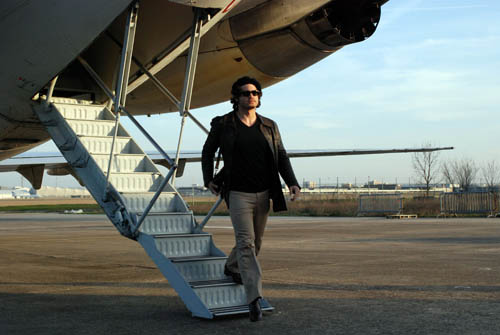
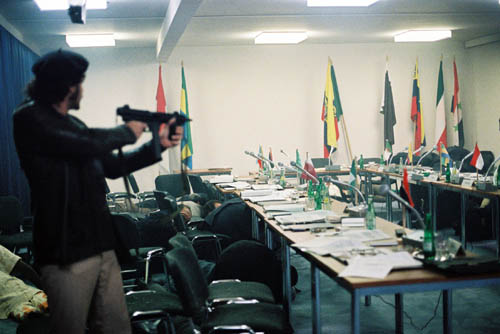
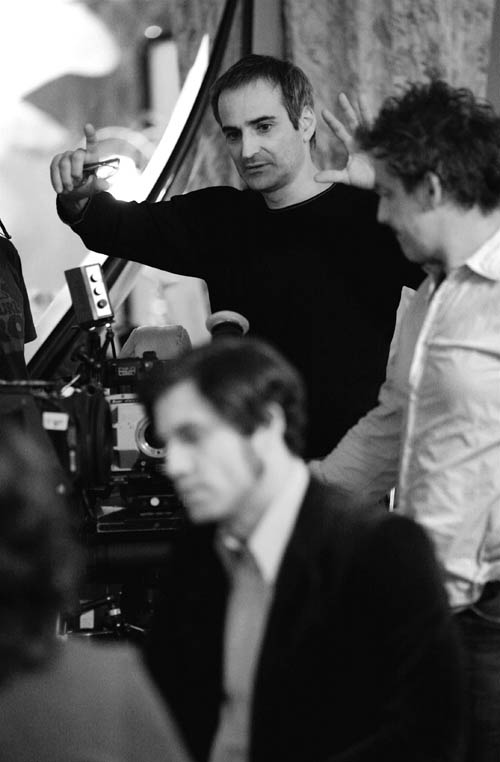
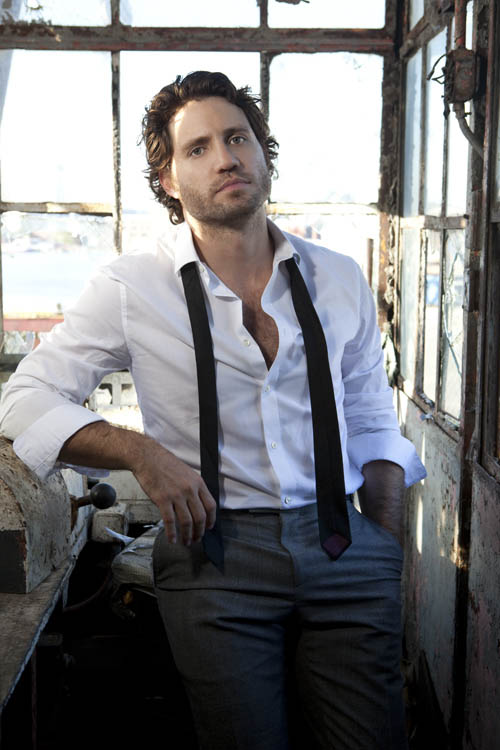
All photos courtesy of IFC Films


